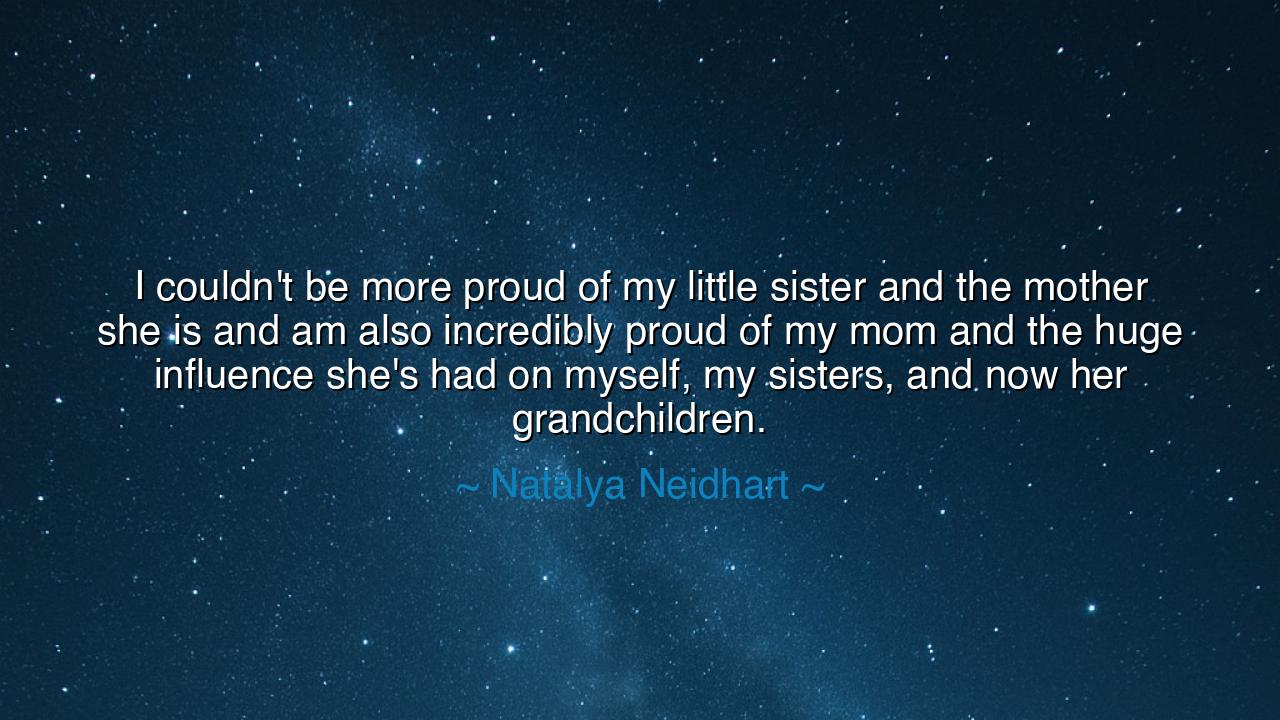
I couldn't be more proud of my little sister and the mother she
I couldn't be more proud of my little sister and the mother she is and am also incredibly proud of my mom and the huge influence she's had on myself, my sisters, and now her grandchildren.






When Natalya Neidhart said, “I couldn’t be more proud of my little sister and the mother she is, and am also incredibly proud of my mom and the huge influence she’s had on myself, my sisters, and now her grandchildren,” she was not merely speaking as a daughter or a sister — she was speaking as the voice of lineage, as one who recognizes the sacred thread of womanhood woven through generations. Her words are a hymn to family, legacy, and the eternal cycle of nurture, in which each generation draws strength from the last and passes it on, renewed. Beneath the warmth of affection lies a timeless truth: that the love of mothers and sisters forms the invisible architecture upon which human life is built.
In ancient times, such words would have been spoken beside the hearth or carved into the stones of memory. The family matriarch, like Natalya’s mother, was seen as the keeper of wisdom — the vessel of strength who not only bore life, but guided it, shaping character and destiny. To honor one’s mother and sister was to honor the divine feminine itself — the nurturing force that sustains the world. Natalya’s pride is not vain but reverent; it acknowledges that greatness is not achieved alone. Just as a river owes its course to the mountains that gave it birth, so too does every child’s strength flow from those who raised them.
The story of Demeter and Persephone, told by the Greeks, carries the same sacred resonance. Demeter, goddess of the harvest, loved her daughter beyond measure, teaching her the rhythms of the earth and the wisdom of the seasons. When Persephone was taken into the underworld, Demeter’s grief turned the world barren — yet her love brought spring again. So too, Natalya’s words speak of that generational renewal: the mother passing wisdom to the daughter, the daughter becoming mother in her turn, and life continuing through the faith and care of women bound by love. The power of that bond shapes not only families but nations, for from it come both compassion and endurance.
In saying she is “proud of my mom and the huge influence she’s had,” Natalya acknowledges that her own strength, discipline, and grace — virtues she embodies as both athlete and woman — were inherited through love and example. A mother’s influence is not shouted, but lived quietly through years of patience, forgiveness, and steady presence. And when she looks to her sister, now a mother herself, Natalya witnesses the continuation of that legacy — the proof that her mother’s virtues have not faded but multiplied. What she celebrates, then, is not merely family success, but the immortality of goodness — the way love ripples through time, shaping souls unseen.
There is a wisdom in her humility. In a world that often glorifies independence, Natalya reminds us that to honor those who came before is not weakness, but wisdom. True strength acknowledges its roots. The warrior who forgets the hands that taught her to stand cannot endure long in battle. By recognizing her mother’s and sister’s roles, Natalya restores balance to the modern spirit — reminding us that greatness is not an individual flame but a shared fire, kindled across generations of devotion.
Consider, too, the story of Queen Elizabeth I, who ruled England with unmatched brilliance yet forever carried within her the lessons of her mother, Anne Boleyn, whose courage and intellect shaped her destiny even in absence. Or think of the countless unnamed mothers and sisters who, through hardship and love, passed on their quiet strength so others might rise. Natalya’s words belong to that same eternal chorus — the voices of women honoring women, of family honoring the sacred chain that binds them to the past and to the future.
The lesson here is simple but eternal: gratitude is the soul of legacy. To look back with pride, as Natalya does, is to keep love alive. Let us, too, speak our thanks aloud — to our mothers who endured, to our sisters who strive, to the families who shaped our hearts. The act of acknowledgment is itself a kind of offering, a way of blessing the roots that hold us upright. For what we honor in others becomes stronger within ourselves.
So, dear listener, remember this truth: the greatest inheritance is love, passed from mother to daughter, sister to sister, generation to generation. It is not measured in wealth or fame, but in the quiet influence of kindness, courage, and care. Like Natalya Neidhart, let us be proud not only of what we achieve, but of the lives that shaped us — for to celebrate them is to keep the sacred fire of family burning through time itself.






AAdministratorAdministrator
Welcome, honored guests. Please leave a comment, we will respond soon